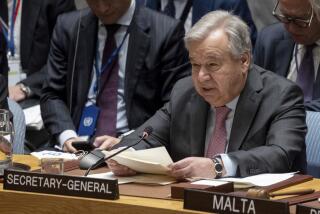Answers to key questions on Palestinians’ statehood bid at U.N.
- Share via
Reporting from Jerusalem — The Palestinians on Friday plan to ask the United Nations to admit them as a member nation. Here are answers to some of the questions arising from their bid.
Why are the Palestinians turning to the United Nations and what do they hope to achieve?
After nearly 20 years of failed peace talks, the Palestinians say they hope their application for U.N. membership will put the Mideast conflict back atop the international agenda, break the deadlock in U.S.-brokered negotiations by increasing pressure on Israel and give their drive for statehood a boost. They are frustrated by what they perceive as a U.S. bias toward Israel and hope that the international community will set down new parameters for negotiations, such as endorsing the concept of using 1967 borders as a baseline for a new Palestinian state and declaring East Jerusalem its capital. They say direct talks with the current Israeli government are futile because Prime Minister Benjamin Netanyahu refuses to pick up where the last round of talks ended.
Would success at the U.N. formally create a new state of Palestine?
No. Palestinians declared their statehood in 1988 and several nations have formally recognized it. But the U.N. does not recognize states. Only other states do that. Still, if the U.N. accepted Palestine as a member state or if it upgrades the Palestinians’ current observer status from nonmember “entity” to nonmember “state,” it would serve as a de facto recognition of their statehood.
Why is Israel opposed?
Though the Israeli government has endorsed the two-state solution, it sees this move as an end run around direct peace talks. Israel says Palestinians want to avoid difficult negotiations and win concessions from the international community without having to give much in return. Israel says such a unilateral move would poison the already tense atmosphere and make future compromises harder.
Even a nonbinding U.N. resolution in the General Assembly that endorsed, for example, the 1967 borders or East Jerusalem as a Palestinian capital would carry considerable weight in talks. Palestinian leaders would find it difficult to accept anything less.
What’s the U.S. position?
The Obama administration agrees that peace talks are the only way to resolve the conflict and has vowed to defeat the Palestinian application for full membership at the Security Council, which must approve new members and where the U.S. enjoys veto power. The U.S. is hoping to persuade Palestinians to hold off on seeking a vote. At the same time, the U.S. has long supported the Palestinian drive for statehood, believing resolution of the Mideast conflict will ease anti-Western tensions in the Arab world. The U.S. also opposes Israel’s construction of settlements in the West Bank and East Jerusalem as illegitimate and supports using 1967 borders as a starting point, with mutually agreed land swaps.
What happens after the Palestinian application is submitted to the Security Council?
A vote is not expected immediately, and the application could be under review for days, weeks or even months. The U.S. and the international community are hoping to use that time to restart peace talks.
What are the chances that negotiations will resume?
Slim, but U.S. officials remain hopeful. Distrust between Palestinian Authority President Mahmoud Abbas and Netanyahu is strong, and neither side has budged regarding talks for the last year. Before returning to talks, Abbas wants Israel to halt settlement construction and resume negotiations based on the 1967 lines with land swaps.
Netanyahu has rejected both demands, though he agreed last year to a temporary settlement moratorium. That led to short-lived talks that the Palestinians walked away from once Israel resumed construction. Both men face considerable pressure from their constituencies to stick to their positions. Yet international diplomats say the U.N. bid may soften their positions.
What if the Palestinians decide to turn to the U.N. General Assembly?
That could increase the stakes. Any such resolution is likely to pass the assembly because Palestinians enjoy strong support there and the U.S. does not wield a veto in that body. The Palestinians have said they might seek to upgrade their status to something similar to that of the Vatican, which could give them access to U.N.-chartered entities such as the International Criminal Court. Israel has warned that any attempt to bring a war crimes case against it in the court would spell the end of talks. Europeans are working to craft a resolution that would upgrade Palestinians’ status, but deny them access to the ICC.
Are Palestinians preparing for another intifada?
It doesn’t appear so, according to Israeli and Palestinian security officials. Abbas has called for peaceful protests and has vowed to crack down on any violence. But it’s difficult to predict what might happen if Palestinian protesters clash with Israeli soldiers or Jewish settlers, who have recently stepped up their attacks against Palestinians.
More to Read
Sign up for Essential California
The most important California stories and recommendations in your inbox every morning.
You may occasionally receive promotional content from the Los Angeles Times.










